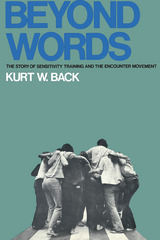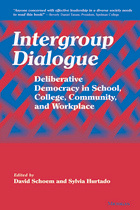2 books about Group relations training

Beyond Words
Story of Sensitivity Training and the Encounter Movement
Kurt W. Back
Russell Sage Foundation, 1972
Sensitivity training, T-Groups, and encounter groups have become a way of life. Beyond Words traces the history of this movement, the background of its successes, its varieties, and its failures. Dr. Back's approach is neither one of wide-eyed admiration nor hostility. Instead, he has written a book that provides the first long, hard look at sensitivity training as a social phenomenon. From its fortuitous beginnings the movement is followed through its developments at Bethel, its growth across the country, its new centers in California, its spread to Europe. The novelty of this movement, an almost religious exercise based on the scientific ethos, is related to the peculiar conditions of the last quarter century. The movement has acquired its own mythos. Dr. Back examines the interplay of the conflicting aims of self-expression and change, and shows how these contradictory aims have affected the ramifications of the movement in theory, in management, in recreation, and in education. Results emerging from studies on effects of sensitivity training indicate a recurrent pattern of great immediate emphasis followed by little permanent beneficial effect. Finally, Beyond Words assesses the overall impact of the movement, its relation to science, its possible changes, and its portent as a symptom of the state of society. Dr. Back examines the interplay of the conflicting aims of self-expression and change, and shows how these contradictory aims have affected the ramifications of the movement in theory, in management, in recreation, and in education.
[more]

Intergroup Dialogue
Deliberative Democracy in School, College, Community, and Workplace
David Schoem and Sylvia Hurtado, Editors
University of Michigan Press, 2001
Intergroup dialogue represents a grassroots effort to meet one of the major challenges facing our democracy today: the lack of communication among diverse groups of people in schools, in communities, and in the workplace. By forging lines of communication among different elements of society, intergroup dialogue helps to create a more just, harmonious, and strong democracy.
Intergroup Dialogue is the most comprehensive study of intergroup dialogue to date, showcasing twelve in-depth case studies, offering critical perspectives, and exploring the foundation of such dialogue in democratic theory. The case studies are drawn from leading American organizations offering intergroup dialogue, including the Anti-Defamation League and the National Conference for Community and Justice, as well as several major universities and consultants to corporate America. Each case study presents a particular program's rationale, its details, an account of its successes, and evaluation data.
The pieces collected by David Schoem and Sylvia Hurtado will be of interest to community leaders, teachers, human resources managers, student affairs deans, and intergroup dialogue practitioners in the United States and abroad.
David Schoem is Faculty Director of the Michigan Community Scholars Program and teaches in the Sociology Department, University of Michigan. Sylvia Hurtado is Associate Professor of Higher Education, University of Michigan Center for the Study of Higher and Postsecondary Education.
Intergroup Dialogue is the most comprehensive study of intergroup dialogue to date, showcasing twelve in-depth case studies, offering critical perspectives, and exploring the foundation of such dialogue in democratic theory. The case studies are drawn from leading American organizations offering intergroup dialogue, including the Anti-Defamation League and the National Conference for Community and Justice, as well as several major universities and consultants to corporate America. Each case study presents a particular program's rationale, its details, an account of its successes, and evaluation data.
The pieces collected by David Schoem and Sylvia Hurtado will be of interest to community leaders, teachers, human resources managers, student affairs deans, and intergroup dialogue practitioners in the United States and abroad.
David Schoem is Faculty Director of the Michigan Community Scholars Program and teaches in the Sociology Department, University of Michigan. Sylvia Hurtado is Associate Professor of Higher Education, University of Michigan Center for the Study of Higher and Postsecondary Education.
[more]
READERS
Browse our collection.
PUBLISHERS
See BiblioVault's publisher services.
STUDENT SERVICES
Files for college accessibility offices.
UChicago Accessibility Resources
home | accessibility | search | about | contact us
BiblioVault ® 2001 - 2024
The University of Chicago Press









